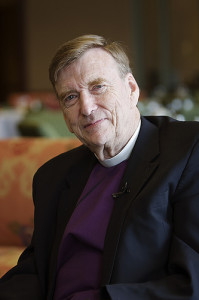
14 years ago John Shelby Spong said “Christianity must change or die.” Episcopalians have been doing both ever since.
Hebrews 11:32-38:
32 And what shall I more say? for the time would fail me to tell of Gedeon, and of Barak, and of Samson, and of Jephthae; of David also, and Samuel, and of the prophets:
33 Who through faith subdued kingdoms, wrought righteousness, obtained promises, stopped the mouths of lions.
34 Quenched the violence of fire, escaped the edge of the sword, out of weakness were made strong, waxed valiant in fight, turned to flight the armies of the aliens.
35 Women received their dead raised to life again: and others were tortured, not accepting deliverance; that they might obtain a better resurrection:
36 And others had trial of cruel mockings and scourgings, yea, moreover of bonds and imprisonment:
37 They were stoned, they were sawn asunder, were tempted, were slain with the sword: they wandered about in sheepskins and goatskins; being destitute, afflicted, tormented;
38 (Of whom the world was not worthy:) they wandered in deserts, and in mountains, and in dens and caves of the earth.
That account, of course, was written sometime during the 1st century. Since that time, a number of other horrifying things have been done to God’s people–they have been fed to the beasts in the Roman arenas, slaughtered by gladiators, beheaded, roasted in ovens, drawn and quartered, racked, and burned at the stake. They’ve had their eyes gouged out and tongues torn out of their mouths. They’ve been drowned to death. In more recent years, they’ve been cast into prison, whipped, electrocuted, and had slivers of wood driven underneath their finger and toenails, separating the nail from the appendage.
Through all this opposition, the church has survived and even continued to thrive. As the great hymn writer has said, “The church shall never perish / her dear Lord to defend / to guide, sustain, and cherish / is with her to the end.” That is the story of the church up till now. It’s the story of an institution that, despite moral failings from within and sometimes brutal repression from without, has continued to march on and grow. And while those who hated the church have long since died, the church marches on across time, “terrible as an army with banners,” as Lewis wrote in The Screwtape Letters. Hold these words and stories in your mind (and, for that matter, your hearts) as you read these words:
No, the Church shouldn’t change for millennials…but I think the Church must (and will) change along with millennials. In other words, we need not compromise the historical tenets of the Christian faith to recognize that this generation has something valuable to contribute to the future of Christianity, as does Generation X, the Boomers, and the generations before them. The article wasn’t intended to be a list of demands, but rather an expression of desires, a casting of vision and an articulation of my hope for the Church. Obviously, the real work begins when we come together in community to do the hard, daily work of reconciliation, listening, serving, and worshipping in spirit and truth.
That comes from Rachel Held Evans, in a follow-up post to her CNN article that was shared over 150,000 times via Facebook. Upon reading such a post, one is tempted to simply point out that if you compare the churches that accommodated modernity with those that made some effort to resist it, it’s the accommodationalists that are dying out, with the Episcopalians leading the way. They’re on pace to be completely extinct by 2037.
Login to read more
Sign in or create a free account to access Subscriber-only content.
Topics:
